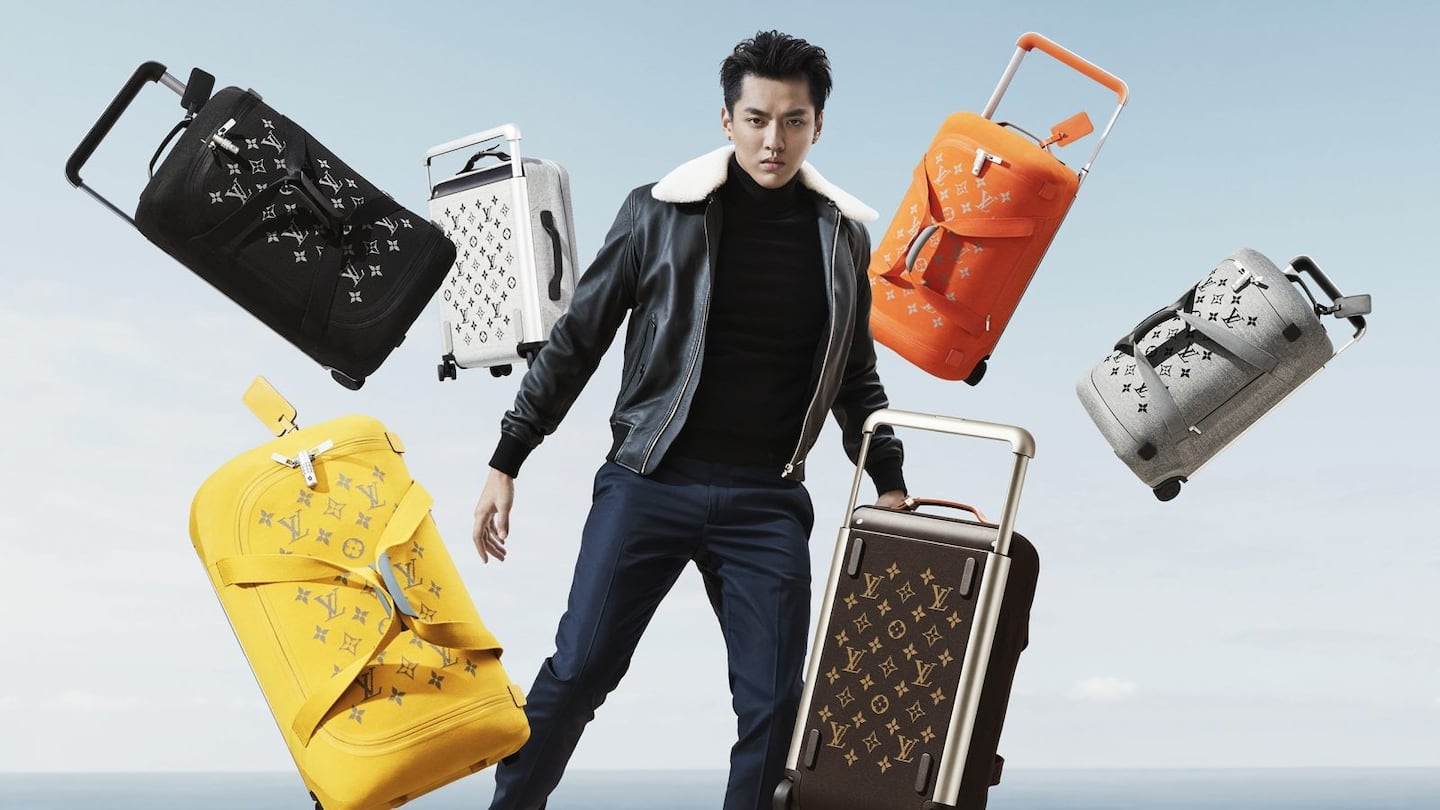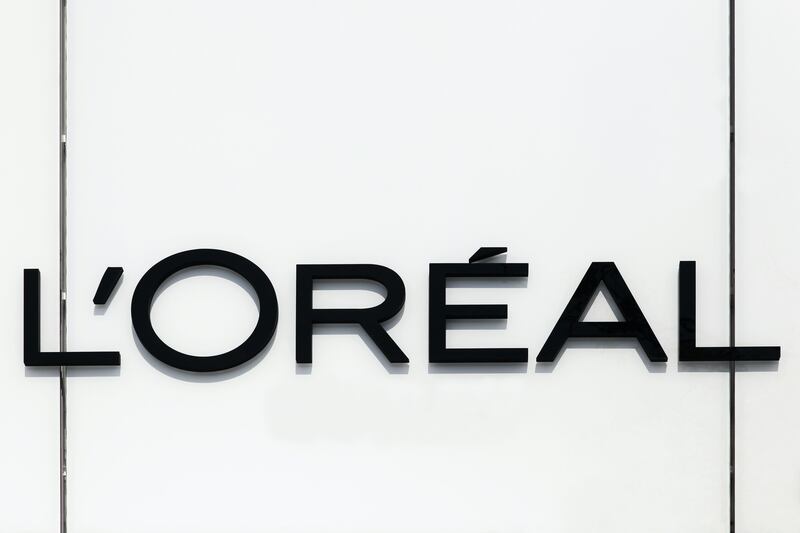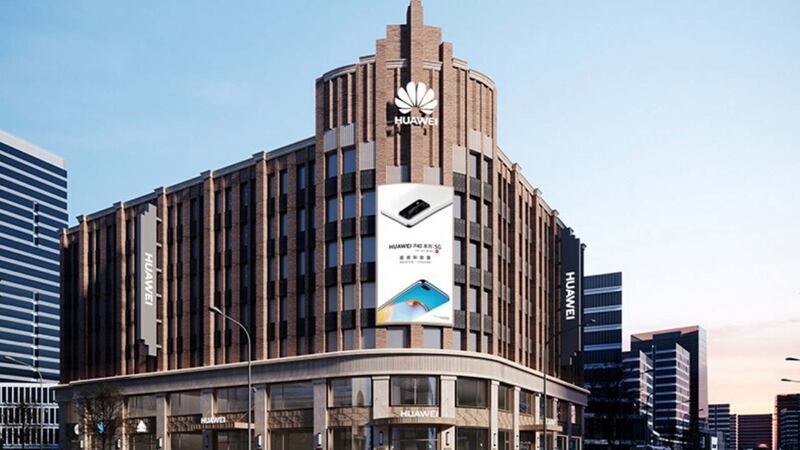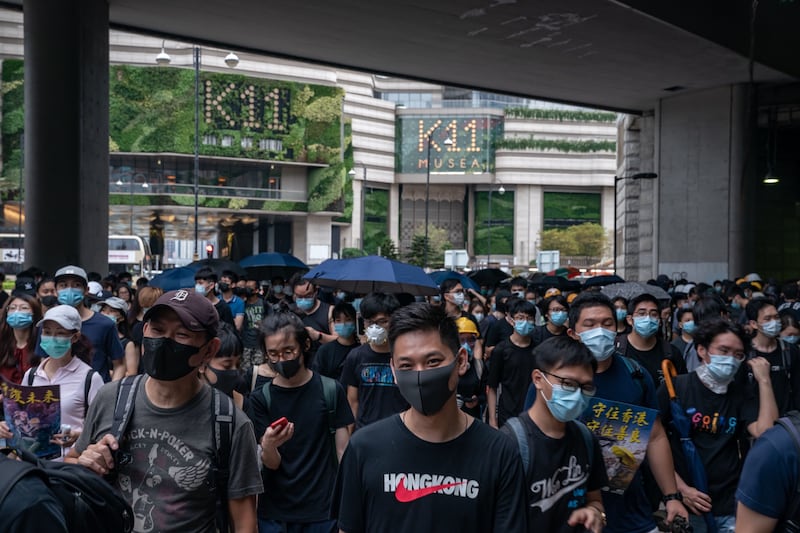
The Business of Fashion
Agenda-setting intelligence, analysis and advice for the global fashion community.

Agenda-setting intelligence, analysis and advice for the global fashion community.

SHANGHAI, China — In the six years since she started a fashion blog in Paris, Yuwei "Yuyu" Zhangzou has been invited to hundreds of fashion shows, events and parties.
After spending a decade in France she relocated to Shanghai in 2018 and began building a content team to work out of a small studio in downtown Jing’an district, in a laneway hiding just behind the shopping mecca of Nanjing West Road, home to one of the greatest concentrations of luxury malls on earth.
With a full-time staff of eight people, Zhangzou is constantly busy with content creation, putting together WeChat articles, Weibo posts and, increasingly, recording video content and livestreams.
Much of her output is sponsored content, as Zhangzou’s Parisian experience and trilingual French, English and Mandarin skills make her a popular choice of Chinese influencer with French luxury brands, including Dior, Louis Vuitton, Cartier and others.
ADVERTISEMENT

Yuwei Zhangzou appears in the global APM Monaco campaign | Source: Courtesy
More recently however, she has been tapped for a brand campaign with a difference, as the first Chinese KOL — or key opinion leader, which is roughly equivalent to "influencer" in local parlance — to head a global campaign for APM Monaco.
The partnership sees Zhangzou as the face of APM Monaco's regular monthly product drops, for June and July. The accessible jewellery brand has leaned heavily on influencer-fronted campaigns for some time, tapping internationally famous social media stars such as Chiara Ferragni, Olivia Culpo and Irene Kim, but this is the first time they have a campaign fronted by a mainland Chinese influencer.
“I started on Instagram and I know that Asian people overseas — all the Chinese students, for example — they are on Instagram and they are looking for Asian faces as well,” Zhangzou said.
“The Chinese bloggers are becoming more and more international and the international brands are trying something different by saying, ‘Chinese influence isn’t just [limited] to one location, it can affect people across the world.’”
Zhangzou is one of a handful of Chinese KOLs who are leveraging their international experiences, and social media presence, to work with brands on campaigns beyond China and its home-grown online platforms.
Anny Fan is a high-profile example of a Chinese KOL who has made some inroads into cracking the international market. Though her 50,000 Instagram followers are dwarfed by her millions-strong following on Chinese social media platforms, a deal inked with Society Management, a talent management company that also represents Adriana Lima, Liu Wen and Kendall Jenner, is a major step on the road toward international success.
“As a first generation KOL in China, many of my followers were students when they started following me, now they have grown up and their outlook is global; their life is global. That’s why I tell brands, it’s more and more important to work with Chinese influencers for their global campaigns,” Fan told BoF, though she admits, there still aren't a lot of examples she can point to yet as a model for Chinese KOL success on the international stage.
ADVERTISEMENT
“But it should be starting [to happen] now,” she added.
No Longer Simply ‘China for China’
According to Julien Lapka, founder of Inner Chapter, a marketing and advertising consultancy based in Shanghai, there has long been a brand marketing mentality of doing "China for China" and "global for global" campaigns, partly because of the obvious need to prepare specialised campaigns for China’s unique social media infrastructure.
However, over the last two years, there has been a significant change. More young people in China now report getting their fashion and beauty inspiration and education from overseas sources or platforms. This should provoke a shift in the way brands think about influencer marketing for the China market.
There is also a realisation that big KOLs are just like a TV ad...just parroting whatever the big brands have to say.
"In the beauty category, whenever we speak to women in their early 20s and ask them who are their big influencers when it comes to makeup and skincare, often someone big like Li Jiaqi will come up, but soon after they will say they are going to Youtube and Instagram for their inspiration," he said. Western social media platforms, including Youtube, Instagram and Facebook are blocked in China, and only accessible domestically via virtual private networks (VPNs) that allow users to fan qiang, or "jump the wall" of China's state-controlled internet environment.
Although part of this increase in attention on international social media platforms is due to a rise in the number of young Chinese people seeking international experiences abroad, through study and travel, that influence doesn’t necessarily stop once they return home.
Chinese diaspora numbers are hard to pin down, but a United Nations estimate from 2017 counted 10 million Chinese-born people residing outside of China. Meanwhile, the numbers of Chinese travellers taking short trips abroad has exploded over the last decade. Though the international travel growth that saw Chinese travellers take roughly 150 million outbound trips in 2018 has been put on pause by Covid-19, the international experiences gained by them can’t be eliminated.
“Absolutely [these international platforms are having an influence] within China, specifically for makeup, beauty and fashion because there is still a great desire to contextualise a certain look or way of dressing in an authentic way. Gaining influence in China means working with the diaspora that live in global cities where many fashion trends emanate. They act as credible cultural carriers,” Lapka added.
ADVERTISEMENT
Lapka isn't just talking about big name KOL media campaigns, either. Getting traction on China's major platforms with someone like Li Jiaqi or Mr Bags is not financially viable for many brands due to the extent to which prices for KOL marketing have sky-rocketed. One impactful alternative is to target Chinese influencers with an international flavour who are also KOCs (key opinion consumers, as opposed to KOLs, something like the equivalent of micro-influencers in a Western context).
He points to Dr. Martens, a brand rooted in mod and punk subcultures, as one that has gained traction in the mainland China market by seeding product with a select group of London-based Chinese international student KOCs, posting on a mix of Chinese and international social media sites.
"Chinese consumers are some of the smartest and best-informed consumers in the world and they will smell inauthenticity from very far away. Some of this move brands have started to make from KOLs to KOCs, there's obviously a budget reason, but there is also a realisation that big KOLs are just like a TV ad and they are just parroting whatever the big brands have to say," Lapka said.
Chinese Celebrities, Global Ambassadors
At the other end of the spectrum, tapping big name Chinese celebrities for global campaign roles is becoming more common as China has emerged as the world’s most important fashion and luxury market.
Michael Kors was one of the first international brands to utilise its Chinese star power in this way, partnering with actress Yang Mi for global campaigns and collaborations available at stores throughout the world as far back as 2017. More recently, Louis Vuitton featured the rapper Kris Wu as its ambassador in the Horizon luggage campaign alongside Karlie Kloss, and singer Lay Zhang was recruited as a global ambassador for Calvin Klein, appearing in its #MyCalvins campaign.

Yang Mi collaborated on a limited edition for Qixi Festival in 2018 that was stocked in Michael Kors stores globally | Source: Courtesy
“[Standard] global campaigns have long struggled to gain traction in China and the content usually only receives minimum engagement on social platforms such as Weibo. Featuring local celebrities in global campaigns [instead of just local for local] is important for brand building and driving social engagement [within China],” explained Amie Song, senior advisory specialist for Gartner in the Asia-Pacific region.
As well as gaining more attention on the international social media accounts of Chinese celebrities (Lay Zhang has 12 million Instagram followers and each of his posts about Calvin Klein on that platform garnered in excess of one million engagements), brands have started using Chinese ambassadors on posters and storefronts most likely to attract Chinese travellers and the diaspora — for example, Estée Lauder's use of Yang Mi's visage at international duty free stores.
There is also a positive halo effect from casting Chinese celebrities for global campaigns that goes beyond the immediate call to action. When done well, it engenders broader goodwill among consumers.
“Chinese consumers are excited to see familiar faces appear alongside global stars, and [like to] feel represented on a global stage. Such patriotic sentiments can be hurt when those with the title of ‘global ambassadors’ or ‘ambassadors’ appear only in local campaigns [and] fans pay close attention to whether or how their idols are featured on a brand’s Instagram or on international sites,” Song said.
Geopolitics Can Make Things Complicated
At a time when questions of nationalism and geo-politics are making the world’s relationship with China increasingly fraught, it’s not difficult to imagine a scenario in which having a particular Chinese celebrity as the face of a global brand becomes an issue with certain communities beyond China.
Chinese celebrities are under a huge amount of pressure at home to prove their patriotic bone fides by speaking out publicly in support of their government’s policies and against perceived slights about China. For example, a celebrity spokesperson for an international luxury brand speaking out in favour of crackdowns in Xinjiang or Chinese annexation of disputed territory could make life complicated in other parts of the world for the brand they represent.
As with all things, context is key. Lapka points to the Nike “model” in which the sportswear giant associates itself with champions in their respective fields, meaning that nationality in many ways take a backseat to notions of success and aspiration.
If a brand wanted to align itself with female empowerment, for example, they could do far worse than looking at an ambassador in the mould of Zhang Weili, the Ultimate Fighting Championship’s current female world strawweight champion.
“Yes, she’s Chinese, but more to the point, she’s an amazing representation of female power. Being a champion trumps ethnicity issues,” he said.
Another example might be sci-fi author Liu Cixin, whose surreal and vividly imagined fictional worlds could prove a rich vein for collaboration with a make-up brand.
“Of course, he is Chinese, so mainland Chinese consumers will be appreciative, but he’s got a Netflix deal, and he’s very popular abroad as well, so that trumps any issues of Chinese-ness. This is a very tense time in terms of notions of nationalism [so] there is a need to tread very carefully,” Lapka added.
In spite of these and other complications, the need to tap Chinese celebrities and influencers for campaigns beyond China may, in the end, come down to commercial realities. If a brand has the budget to spend on one big star, and half of their sales are expected to come from mainland China, they will have little choice but to increasingly rely on Chinese ambassadors for local, regional, and even global campaigns.
“Chinese influencers can be best used as part of regional campaigns, so not just for China but for the Asian region as a first step, then maybe the global campaign is the next step,” Anny Fan suggested.
“I hope there will be more opportunities for us to do global campaigns in the future and I think brands will see it works for them, too.”
时尚与美容
FASHION & BEAUTY

L'Oréal sign | Source: Shutterstock
How China Sees L'Oréal's Decision to Remove “Whitening” From Products
Skin whitening products are immensely popular in China, where messages in society continually describe the ideal woman as "fair, rich and pretty." Sales of whitening products in China reached a whopping 440 billion yuan ($62.2 billion) in 2019. In light of this, global brand initiatives to remove some skin whitening products altogether have received mixed reactions on Chinese social media, with critics arguing that they're being robbed of choice as brands become "too politically correct." However, in the past few years, as Western brands like Fenty, Coty and NYX Professional Makeup have entered the Chinese market, they have brought with them the concept of "inclusive makeup" so other consumers are becoming more welcoming to the idea of broader beauty standards. (Jing Daily)
China's La Chapelle Fashion Warns of Delisting Risk
La Chapelle, which runs clothing brands such as 7.Modifier and Pote, has given a delisting warning due to its poor performance over the past two years. The company's shares were suspended for one day earlier this week after reporting two straight years of losses. In the first quarter, net losses widened by more than ten times to 342 million yuan ($48.4 million) from a year ago, according to its earnings report published on June 29, while revenue fell 58 percent to 1 billion yuan ($141.6 million). Last year, the company closed nearly half of its Chinese stores, sold assets, and declared its unit Jack Walker Shanghai Clothing bankrupt. (Yicai Global)
科技与创新
TECH & INNOVATION

Pinduoduo logo | Source: Courtesy
Pinduoduo is the Platform for Global Brands to Watch
Since its launch just five years ago, the US-listed social e-commerce platform Pinduoduo has become perhaps the most important new e-commerce player in the massive China market. From a brand perspective, Pinduoduo is interesting because of the platform's popularity in lower-tier cities, in which consumers have less purchasing power than their compatriots in Beijing or Shanghai but arguably more leisure time and strong demand for shop-ertainment. Pinduoduo is also popular among younger consumers, who — like the aforementioned lower-tier consumers — lack the spending power of established urban shoppers, yet are some of the "stickiest" users of e-commerce and streaming video platforms in China. (Content Commerce Insider)
India Bans Chinese Apps Amid Border Crisis
India has banned 59, mostly Chinese, mobile apps including Bytedance's TikTok and Tencent's WeChat in its strongest move yet targeting China in the online space since a border crisis erupted between the two countries last month. The ban is expected to be a big stumbling block for Chinese firms such as Bytedance in India, which have placed big bets in what is one of the world's biggest web services markets. Beijing-headquartered Bytedance had plans to invest $1 billion in India, open a local data centre and had recently ramped up hiring in the country. India is the biggest driver of TikTok app installations, accounting for 611 million lifetime downloads, or 30.3 percent of the total, app analytics firm Sensor Tower said in April. (Reuters)
消费与零售
CONSUMER & RETAIL

Huawei's newly opened Shanghai flagship store | Source: Courtesy
Huawei’s Giant New Shanghai Flagship Includes Health, Fitness and Travel Simulations
Huawei's three-storey Shanghai flagship — at 5,000 square metres it's equivalent to the size of many malls — has moved in next to Apple, Samsung and Gucci on Nanjing Road, in a space vacated by Forever 21. Some 220 consultants work in the store, with skillsets including music, dance and vlogging. The theory is that by sharing common interests and hobbies with customers, they can offer suggestions on product use and technical support. The second floor features a "Seamless AI Life Zone" encompassing smart experiences in different scenarios such as a smart home, mobile office, fitness and health, travel and entertainment. Products are placed in settings to enable guests to experience the Internet of Things paired with Huawei's proprietary 5G technology. (Retail News Asia)
Affluent Consumers in China and US Have Very Different Ideas About Privacy
A survey of high-income consumers from nine different countries for the Luxury Institute's "State of the Luxury Industry 2020" report provide fresh insights into propensities of affluent consumers to permit sharing of various types of personal information. One prominent theme to emerge from the research is a fundamentally more permissive attitude toward sharing personal data in China compared to the United States. Affluent Chinese consumers have a greater propensity than Americans to share data across all eight categories of personal data under consideration. US consumers were four times more likely (44 percent) than those in China (11 percent) to say that they would not allow brands to access any of their data; 85 percent of Chinese consumers say that they would provide data to brands in exchange for more personalised service, but only 42 percent of US consumers said the same. (Luxury Institute)
政治,经济与社会
POLITICS, ECONOMY, SOCIETY

Protesters march on a street on August 3, 2019 in Hong Kong, China. | Source: Getty Images
Businesses Fall in Line Behind Hong Kong’s New Security Law
The new national security law for Hong Kong that was adopted in China on Tuesday gives the government in Beijing sweeping powers to crack down on dissent. The new legislation, released to the public for the first time after its adoption, provides a blueprint for the authorities and courts to suppress the city's protest movement and for China's national security apparatus to pervade layers of Hong Kong society. The business world has largely fallen in line behind China's campaign to tighten its grip on Hong Kong though questions remain as to Hong Kong's future as a financial capital as it's brought further under Beijing's control, especially if its citizens react by reigniting the widespread protests that have crippled Hong Kong's retail and tourism market. (The New York Times)
Fake Gold Backed $2 Billion of Loans to a Chinese Jewellery Company
More than a dozen Chinese financial institutions, mainly trust companies, loaned 20 billion yuan ($2.8 billion) over the past five years to Wuhan Kingold Jewelry Inc. with pure gold as collateral and insurance policies to cover any losses. Kingold is the largest privately owned gold processor in central China's Hubei province. Its shares are listed on the Nasdaq stock exchange in New York and the company is led by Chairman Jia Zhihong, an intimidating ex-military man who is also the controlling shareholder. At least some of 83 tonnes of gold bars used as loan collateral have now proven out to be nothing but gilded copper, leaving lenders holding the bag for the remaining 16 billion yuan ($2.3 billion) of loans outstanding against the bogus bars. (Caixin)
China Decoded wants to hear from you. Send tips, suggestions, complaints and compliments to our Shanghai-based Asia Correspondent casey.hall@businessoffashion.com.
With consumers tightening their belts in China, the battle between global fast fashion brands and local high street giants has intensified.
Investors are bracing for a steep slowdown in luxury sales when luxury companies report their first quarter results, reflecting lacklustre Chinese demand.
The French beauty giant’s two latest deals are part of a wider M&A push by global players to capture a larger slice of the China market, targeting buzzy high-end brands that offer products with distinctive Chinese elements.
Post-Covid spend by US tourists in Europe has surged past 2019 levels. Chinese travellers, by contrast, have largely favoured domestic and regional destinations like Hong Kong, Singapore and Japan.